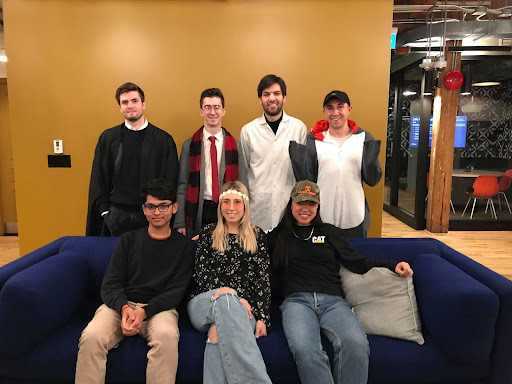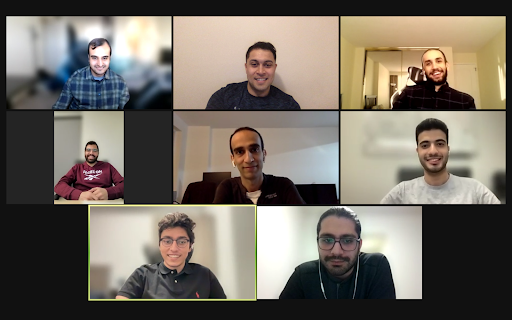As part of Entrepreneur First Toronto’s initial cohort in the city, startups TriplePlay (formerly Lobby), Vivid Machines, getware.ai, and OutPoint have raised a collective $4.5 million USD ($5.7 million CAD) in seed funding.
Entrepreneur First (EF) is a venture builder and investor that also provides mentorship and programming for its startups. It claims over 1,000 people applied to be a part of the seven-month-long Toronto program, of which only 50 people got selected to participate.
According to the company, EF Toronto facilitated over 175 virtual investor meetings for its founders across over 90 funds and over 30 angels amid the pandemic. EF claimed this makes it one of the most successful launches within its network of seven offices.
“I think Canada has a huge right to win in a variety of spaces, and we need to think bigger as a country – inside EF and outside of EF.”
Funding was raised from seed-stage investors and angels from all over the world – including EF Toronto itself, which invested $100,000 in each company for a 10 percent stake.
One of the companies was TriplePlay. Created by previous startup founder Mark Hlady and former CTO of Wealthsimple Yuri Takhteyev, the entrepreneurs hope to make it easier for employees to socialize during virtual events.
Having the idea before the pandemic, Hlady says the shift to virtual work served as a catalyst for TriplePlay, a startup that aims to make remote social events better than in-person.
“I kind of knew… there would be a moment where we can actually show up to the same spot, get to know each other, play games together, move between conversations, and it will legitimately be fun,” said Hlady. “We found TriplePlay in the pandemic because all of a sudden everybody needed this more than ever.”

TriplePlay raised $1 million from Goodwater Capital, N49P, Box One and angel investor Charlie Songhurst, former head of strategy at Microsoft, in spring for initial operations and salaries. Hlady says the startup only sees demand for its product growing as the world continues to digitize.
For startup OutPoint, founder Rob Palumbo already had a background in growing businesses from seed to Series B and beyond. After finding his co-founder Sean Billings, an expert in machine learning, Palumbo realized he could help B2C businesses understand and diversify the value of their marketing spend.
OutPoint secured an initial $650,000 from Tuesday Capital, MGV, Mistral Capital and angels from companies such as Uber and Shopify. Now, Palumbo says the company is eyeing the possibility of opening another round of investment after raising over $1.1 million in July. He says the funds will mostly be used to hire talent to build on OutPoint’s AI research function.
“We are very proud to have launched OutPoint in Toronto. Tech and AI research talent, in particular, is very good [here] and that feeds into EF, but it also feeds into our company,” said Palumbo. “And they will pay dividends to Toronto for a long period to come.”’

Branching outside of Toronto is startup Vivid Machines, led by experienced product leader and engineer Jenny Lemieux and computer science PhD Jonathan Binas.
Their company is working with Ontario apple orchards to develop spectral sensor and computer vision tech to digitize specialty crop production. They want to cut down on what they say is 30 percent of the fruit and vegetable discard that don’t make it to market.
“What we’re building is a system that enables growers to actually see what’s going on for every single plant and every single fruit, every time they drive through the fields,” said Lemieux.
With a $1.4 million investment as of June from Entrepreneur First SPV, N49P, Box One, angel Peter Diehland from Skadi Capital, and a grant from the Canadian government, Vivid Machines is planning to design and buy parts for sensors and pay engineers to build the computer vision, software and mechatronics of the next version of its system.
Getware.ai also uses machine learning for its business. Founders Grant Munro, a repeat founder (Flashstock was acquired by Shutterstock in 2017), and natural language processing AI researcher, Pourya Vakilipourtakalou, sought to aggregate and extract product and customer insights from interactions for product and marketing teams.
After his previous startup got acquired, Munro realized the amount of information that companies were missing due to non-streamlined work processes.
“It became clear that the more we understood the customer and how our product was actually helping with a particular need, the better we were actually filling our need and building a great product,” said Munro. ”The challenge was, there’s just so many inputs to learn about the customer.”

As a serial entrepreneur, Munro says EF Toronto helped him streamline the process of starting a business.
“The value proposition of EF, to basically introduce you to 25 potential CTOs that are vetted from a quality perspective, but also aspirationally want to start a business, was really, really appealing,” said Munro.
After raising $1.4 million in June from MaRS IAF, N49P, and angels including Abraham Thomas (former portfolio manager at Simplex), and Charlie Songhurst (former head of strategy at Microsoft), primarily to hire talent, the startup is looking into closing another round of funding in Q1 or Q2 of 2022.
Rachel Zimmer, a partner and general manager of EF Toronto, says EF chose Toronto as a potential location in 2019 due to the level of talent and number of hubs, academic institutions and research labs.
She says the success of Toronto is comparable to EF’s biggest location in London, England, which was established 10 years ago.
“I think Canada has a huge right to win in a variety of spaces, and we need to think bigger as a country – inside EF and outside of EF,” said Zimmer.
EF Toronto is currently underway with its second cohort, with applications for its third cohort closing on Dec. 12.
Feature image courtesy Vivid Machines.


